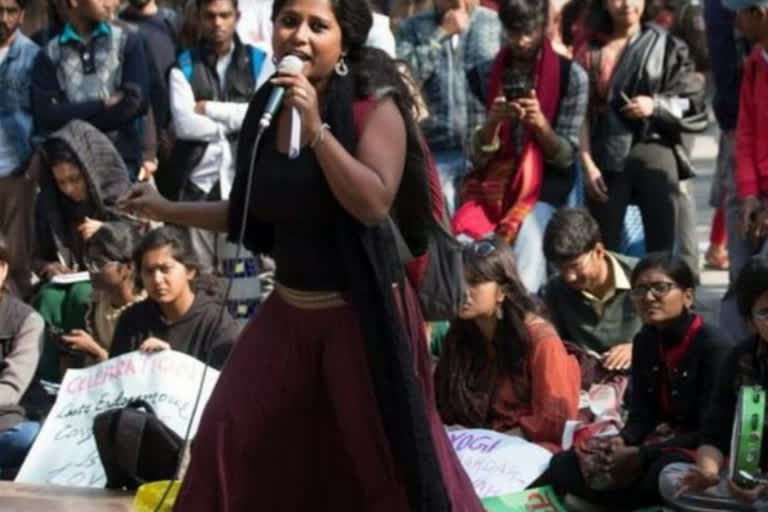New Delhi: The Delhi High Court Tuesday granted bail to Pinjra Tod member Devangana Kalita in the northeast Delhi violence case.
It said the police failed to prove she instigated women of a particular community or gave hate speech. It also said she was seen in a peaceful agitation which is her fundamental right.
"The agitation, held against the citizenship law CAA, had been going on for long with print and electronic media present throughout, in addition to the cameras of the police department, but there is no evidence which establishes that the alleged offence took place on Kalita's action," the high court said.
The evidence produced constituted statements recorded much belatedly, under section 164 CrPC, though the witnesses allegedly remain present at the spot throughout, the court observed.
The charge sheet has already been filed against the petitioner on June 2. Moreover, I have gone through the inner case diary produced in a sealed cover along with pen drive and found that though her presence is seen in peaceful agitation, which is a fundamental right guaranteed under Article 19 of the Constitution of India, however, failed to produce any material that she in her speech instigated women of a particular community or gave hatred speech due to which precious life of a young man has been sacrificed and property damaged, Justice Suresh Kumar Kait said in the 21-page judgement.
The court granted bail to Kalita on furnishing of a personal bond of Rs 20,000 and a surety of the like amount. It also directed that she will not directly or indirectly influence any witness or tamper with the evidence and not leave the country without the permission of the trial court.
Kalita, however, will not be released from jail as she has managed to secure bail in only three of the four cases registered against her. She is yet to secure bail in a case under UAPA.
Kalita and another member of the group Natasha Narwal were arrested in the case in May by the Crime Branch of Delhi Police and booked under various sections of the Indian Penal Code including rioting, unlawful assembly and attempt to murder.
They have also been booked under the stringent anti-terror law - Unlawful Activities (Prevention) Act in a separate case related to the communal violence, for allegedly being part of a "premeditated conspiracy" in the riots.
Communal clashes had broken out in northeast Delhi on February 24 after violence between citizenship law supporters and protesters spiralled out of control leaving at least 53 people dead and around 200 injured.
In all, four cases have been registered against her, including in relation to the northeast Delhi riots earlier this year and violence in old Delhi''s Daryaganj area during protests against the Citizenship Amendment Act (CAA) in December last year.
The police had earlier told the high court that they do not have the videos of the time when Kalita was allegedly making instigating speeches during the riots incident.
It had said that they have the videos of her allegedly instigating people before the riot incidents that took place on February 24 and 25 and also of February 22 and 23 when a large gathering was sitting and protesting outside Jafrabad metro station against the Citizenship Amendment Act (CAA).
The high court, in its verdict, said Kalita satisfied the triple test which has been upheld by the Supreme Court in Congress leader P Chidambaram's money laundering case in the manner that she was arrested without even notice under the CrPC and she remained available at her home on May 23 and even provided her phone to the police previously and had also joined the investigation.
Evidently, she did not try to evade arrest or even file for anticipatory bail because she had no reason to believe that she ought to be in custody. The petitioner is a student pursuing her higher education and sufficient standing in society without any possibility of fleeing from justice, the court noted.
Regarding tampering with evidence, the court said the material in relation to her participation in the protests are available with the investigating agency and there is no documentation or evidence of any other nature in her possession.
On the third test, influencing witnesses, the court said she was not in a position to influence witnesses in the FIR, which in any event appears to relate to public servants/ police officials.
The court said it is settled law that the purpose of incarceration during trial is not punitive and incarceration is to be limited to cases where it is absolutely essential.
In my considered opinion, no prejudice would be caused to the respondent's investigation by a grant of relief to the petitioner, and she would be prevented from suffering further unnecessary harassment, humiliation and unjustified detention.
"Moreover, persons similarly placed as the petitioner, as per documents placed on record by the investigating agency, have not been arrested by the investigating agency in the subject FIR, and as such, the continued custody of the petitioner in the subject FIR would serve no purpose," Justice Kait said.
Kalita had challenged a trial court's order which had dismissed her bail application.
Pinjra Tod (Break the Cage) was founded in 2015 with an aim to make hostels and paying guest accommodations less restrictive for women students.
(PTI REPORT)
ALSO READ: AAP's Tahir Hussain interrogated over riots funding



